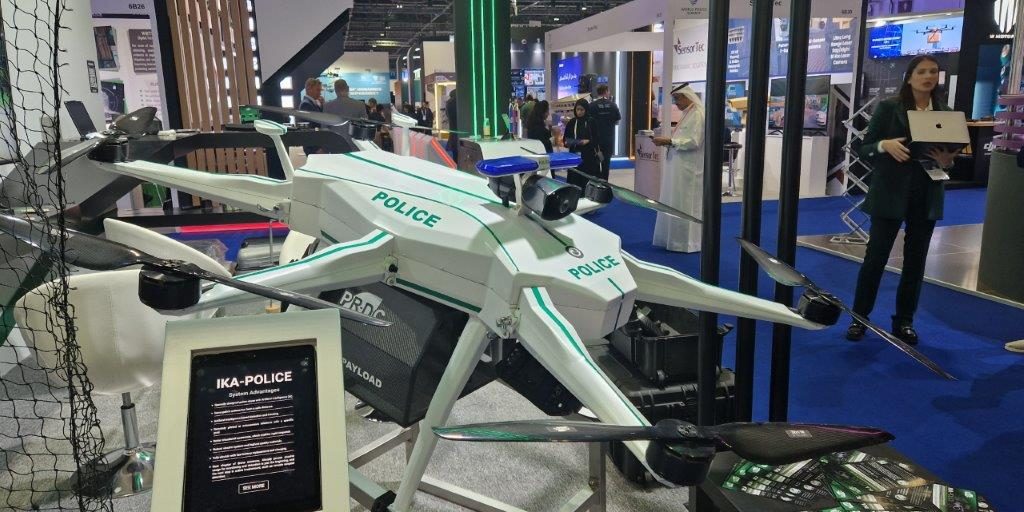The use of artificial intelligence (AI) and drones is becoming increasingly important for authorities and organizations with security tasks (BOS). This also applies to the police forces. How far the technology has already become clear at this year’s “World Police Summit 2023” in Dubai.
At the invitation of the Dubai Police, security experts from 112 countries met for three days under the motto “The Future of Policing”. Management issues were also discussed. The excitement about the possibilities of new technologies is unmistakable throughout the conference streams and the exhibition in the World Trade Center Dubai. Martial-looking police cars to the prototype of a driverless, autonomous patrol car, which is to be used on the streets of Dubai from 2025, can be seen there. Drones and earthbound robots in a wide variety of sizes and with different purposes (from medicine delivery to demolition operations) dominate the exhibition. There is even state-of-the-art radio and camera equipment for police dogs.
Even the youthful-looking assistant professor of Rabdan Academy, Dr Ghaleb Victorio Krame, gets shiny eyes when he talks about the current and future possibilities of autonomously flying, AI-controlled drones. For example, they are difficult to locate and strengthen because of a lack of radio control, among other things. Yet the man knows the other side.
Until 2020, he held high police management positions in the Mexican state of Tamaulipas, including responsibility for the penal system and human resources. As early as the 1990s, the drug cartels unloaded their packages there by drone, he says. Police and prisons had nothing to oppose this delivery route and eventually covered the prison yards with catch nets.
Europe lags behind
In the meantime, a similar threat is looming again. The drug cartels have whole swarms of autonomous drones flying, which in case of doubt not only transport drugs but can also kill political opponents. This is currently difficult to prevent. Krame therefore calls for the development and use of state-of-the-art drones for the police.
However, at least in Europe, this demand is not only opposed by a lack of understanding, limited budgets, but also by regulatory framework conditions and complex training requirements. The advantages of drones are undisputed: they are faster, cheaper and even safer than helicopters, for example. In the USA, on the other hand, the conditions of use have been clarified by the responsible Federal Aviation Administration and, from the police’s point of view, are easy to handle.
Dr. Anderson Rocha, professor at the Brazilian University of Campinas, explains that there are fascinating reports on other possible uses of AI, especially in digital forensics. In this field, biotechnologies, nanotechnologies, robotics and the Internet of Things (IoT) play together. Identifying people in crowds is a big issue. AI analysis of video footage was used to identify almost all of the participants shortly after more than 1,000 supporters of former President Jair Bolsonaro attacked the Brazilian parliament in January. Meanwhile, AI can already identify people by their gait. On the other hand, the technology can help expose “fake news” through targeted analysis of network content and social media. And not only in the media, but also in the field of scientific publications.
Already in the opening keynote, the Secretary General of Interpol, Jürgen Stock, former Vice President of the BKA and thus one of the few Germans at the event, had given the conference motto a special perspective: In order to be able to fight them effectively, one must already anticipate tomorrow’s threat scenarios. Areas such as organized crime (OC) and financial fraud via cryptocurrencies are internationally positioned and technologically highly equipped.
Interpol with its own “Innovation Centre”
In order to keep up with this “arms race”, Interpol now maintains an “Innovation Centre” in Singapore. In addition, Interpol is increasingly seeking multinational partnerships to fight crime. The same applies to the coordination of global standards for police work and the optimisation of international police data exchange, says Stock.
These demands are echoed in the discussions on prevention and innovation, in which the need for “trusting” cooperation is repeatedly emphasized. Police representatives from New Zealand, the American New York Police Department and Dubai, for example, are in complete agreement that trust is the basis for the success of police work.
AI and drones are also topics of the European Police Congress, organized by Behörden Spiegel. Further information: www.european-police.eu







